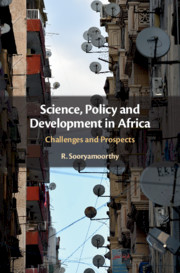Book contents
- Science, Policy and Development in Africa
- Science, Policy and Development in Africa
- Copyright page
- Dedication
- Contents
- Figures
- Maps
- Tables
- Preface
- Abbreviations and Acronyms
- 1 Science, Development and Africa
- 2 Science from Africa
- 3 Production of Science in Africa
- 4 Scientific Research Areas
- 5 Collaboration: Importance for Africa
- 6 Policy Matters in Science and Development
- 7 Science and Development
- References
- Index
1 - Science, Development and Africa
Published online by Cambridge University Press: 17 August 2020
- Science, Policy and Development in Africa
- Science, Policy and Development in Africa
- Copyright page
- Dedication
- Contents
- Figures
- Maps
- Tables
- Preface
- Abbreviations and Acronyms
- 1 Science, Development and Africa
- 2 Science from Africa
- 3 Production of Science in Africa
- 4 Scientific Research Areas
- 5 Collaboration: Importance for Africa
- 6 Policy Matters in Science and Development
- 7 Science and Development
- References
- Index
Summary
Africa has been a source of science and scientific discoveries. The continent continues to attract the world, which has led to some breakthroughs in science. Since colonial times, science has been part of the existence of Africa. The continent is a rich field for scientific expeditions, experiments and research. Today, Africa is a major region contributing to world science in a significant measure. Since the post-colonial period, several African countries have taken science more seriously and some have advanced scientifically. Science production, measured in terms of scientific publications, has shown an increase in Africa in recent years. Scientific collaboration with international partners has assisted Africa in this and in the visibility of its science in the world. Science is being recognised as the main driver for economic growth and development in African countries. The role of science in national development is evident in the policy documents of these countries. Most have drafted a science policy that aims to integrate with their national development plans and strategies, but how far Africa makes use of the science that it produces and adopts for its national development is not known. In other words, it is about the relationship between science and national development.
- Type
- Chapter
- Information
- Science, Policy and Development in AfricaChallenges and Prospects, pp. 1 - 40Publisher: Cambridge University PressPrint publication year: 2020

